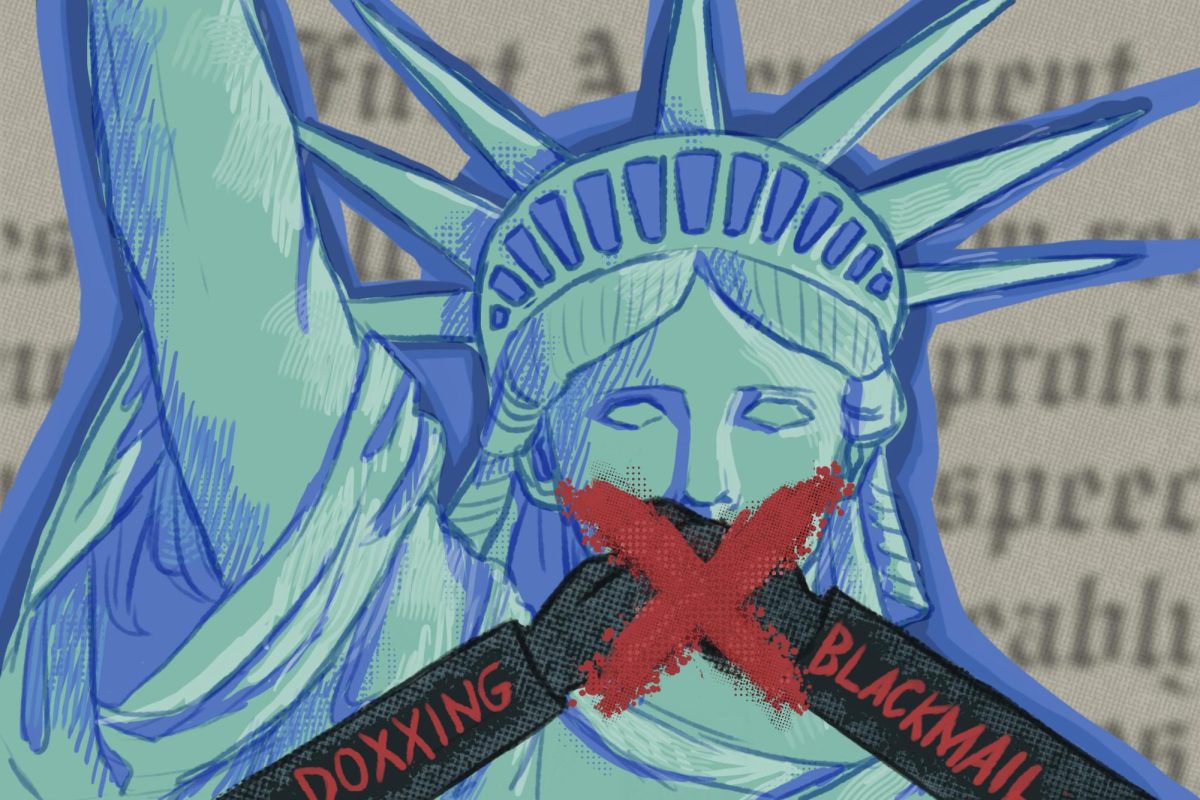The opportunity to engage in civil, respectful discourse is a privilege we share at Harker. The Israel-Hamas conflict has made it clear that this privilege is not prevalent outside of Harker, and that America’s constitutionally-protected right to free speech is conveniently disregarded by the public in times of polarizing divide. In America, it’s become clear that only one opinion has become the right and safe one to have, and any opposing opinion can lead to serious consequences.
Following the Oct. 7 Palestinian militant group Hamas’ attack on Israel, the Harvard Undergraduate Palestine Solidarity Committee released a statement which 33 organizations signed. The statement expressed support for Palestine and held “the Israeli regime entirely responsible for all unfolding violence.” Their letter of support went viral.
Five days later, a “doxxing truck” appeared on the Harvard campus. The truck displayed the names and faces of specific organization members under the title “Harvard’s Leading Antisemites” despite the letter only being signed by organizations and not individual students. Websites popped up throughout the internet with the names and background history of the members linked to student organizations that signed the letter.
In the following days, Harvard donors pulled their fellowship money, and a billionaire couple left the school’s executive board. Wall Street executives and at least a dozen other business executives called for the compilation of a list of the students’ names in order to blacklist them from future hiring processes.
The targeted backlash that individual members affiliated with Harvard student groups received underscores America’s double standard in its title as a champion of freedom of speech and press. In times of serious conflict, the First Amendment is so easily disregarded by the public in order to pave the way for personal attacks and public shaming solely because an individual does not have the “right” opinion.
The disregard for the right of free speech is not only present in the masses. It is also present in the upper levels of the U.S. government. Palestinian House representative Rashida Tlaib was censured by the House of Congress for her criticism of Israel and PM Netanyahu’s actions. One congressman even stated that she “levied unbelievable falsehoods about our greatest ally, Israel, and the attack on October 7.”
This all serves to demonstrate that America has an issue with upholding its Constitutionally-established and esteemed right of free speech, and this issue has lasted for decades now. America’s Red Scare in the 1950s, the period of public hysteria over individuals’ possible connections to Communist ideology that sparked mass media persecution, was the first event that clearly revealed the fragility of the First Amendment.
This presence of this fragility has never been clearer than it is now.
The right to freedom of speech is one of America’s defining features — it should not be a contingent clause on an individual’s rights. Especially in periods of high tensions, every individual in America should be able to speak with the assurance that they will not lose their jobs, their safety and their reputations over their own words.
These unprotected university students’ words were not suppressed, but they faced publicly propagated media prosecution and serious long-term ramifications as a result of association with the letter as well as their views.
The reaction of the public, especially those in power, amplifies a serious message in today’s public forum: Speak at your own risk.
These potential consequences do not represent the true conditions of freedom of speech — they stand as an implicit threat to one’s future should they choose to speak out.
The civil environment within Harker is not prevalent outside of the school, and as we move into the next stages of our lives, understanding those with differing views and not shying away from discussing difficult topics is essential in order to promote cohesion as well as free exercise of our rights. Successful civil public discourse acknowledges the complexities of ongoing social issues and crises and is a stepping stone towards change.
Most importantly, with a clear understanding of our rights, it is necessary to directly call out and be open to hearing different perspectives to build the civil environment inside of Harker outside. Constitutionally protected rights come with the implication that they remain unchanged, no matter the circumstance, and our generation should not be afraid to admonish violations of citizens’ rights and create a civil environment in the public sphere.


















![“[Building nerf blasters] became this outlet of creativity for me that hasn't been matched by anything else. The process [of] making a build complete to your desire is such a painstakingly difficult process, but I've had to learn from [the skills needed from] soldering to proper painting. There's so many different options for everything, if you think about it, it exists. The best part is [that] if it doesn't exist, you can build it yourself," Ishaan Parate said.](https://harkeraquila.com/wp-content/uploads/2022/08/DSC_8149-900x604.jpg)




![“When I came into high school, I was ready to be a follower. But DECA was a game changer for me. It helped me overcome my fear of public speaking, and it's played such a major role in who I've become today. To be able to successfully lead a chapter of 150 students, an officer team and be one of the upperclassmen I once really admired is something I'm [really] proud of,” Anvitha Tummala ('21) said.](https://harkeraquila.com/wp-content/uploads/2021/07/Screen-Shot-2021-07-25-at-9.50.05-AM-900x594.png)







![“I think getting up in the morning and having a sense of purpose [is exciting]. I think without a certain amount of drive, life is kind of obsolete and mundane, and I think having that every single day is what makes each day unique and kind of makes life exciting,” Neymika Jain (12) said.](https://harkeraquila.com/wp-content/uploads/2017/06/Screen-Shot-2017-06-03-at-4.54.16-PM.png)








![“My slogan is ‘slow feet, don’t eat, and I’m hungry.’ You need to run fast to get where you are–you aren't going to get those championships if you aren't fast,” Angel Cervantes (12) said. “I want to do well in school on my tests and in track and win championships for my team. I live by that, [and] I can do that anywhere: in the classroom or on the field.”](https://harkeraquila.com/wp-content/uploads/2018/06/DSC5146-900x601.jpg)
![“[Volleyball has] taught me how to fall correctly, and another thing it taught is that you don’t have to be the best at something to be good at it. If you just hit the ball in a smart way, then it still scores points and you’re good at it. You could be a background player and still make a much bigger impact on the team than you would think,” Anya Gert (’20) said.](https://harkeraquila.com/wp-content/uploads/2020/06/AnnaGert_JinTuan_HoHPhotoEdited-600x900.jpeg)

![“I'm not nearly there yet, but [my confidence has] definitely been getting better since I was pretty shy and timid coming into Harker my freshman year. I know that there's a lot of people that are really confident in what they do, and I really admire them. Everyone's so driven and that has really pushed me to kind of try to find my own place in high school and be more confident,” Alyssa Huang (’20) said.](https://harkeraquila.com/wp-content/uploads/2020/06/AlyssaHuang_EmilyChen_HoHPhoto-900x749.jpeg)






Will Gonsior • Dec 5, 2023 at 3:14 pm
This article is absolutely right about the decay of freedom of speech. It does feel remarkably one-sided, however. Rashida Tlaib was censured for saying “From the river to the sea, Palestine will be free,” a phrase which advocates for Palestinian control of Israel (which could only be effected by force). Censuring her may or may not have been the right idea (Representatives get held to a higher standard than the populace, and a censure isn’t exactly any real form of punishment; on the other hand, Rep. Tlaib is entitled to share her opinions, and “from the river” isn’t necessarily an obvious call for violence) but the Aquila’s high journalistic standards should mean that the actual reason isn’t replaced with a straw man. The doxxing that Harvard experienced, like almost any doxxing, was completely unacceptable. However, that would have been a great opportunity to delve into double standards about speech (and what is considered censurable) on college campuses, where speakers are often blocked or shouted down. This is in sharp contrast to how they’ve handled the Israel-Hamas conflict. According to Paul for the New York Times in 2023, when a Jewish student came to the on-campus housing where she lived to find a “Zionism is genocide” banner, Stanford reacted by… requesting that it be moved, but allowing it elsewhere because it was protected speech. (This would be a fair response for a school not ranked 207 out of 248 in FIRE’s free speech rankings.) Free speech for me and not for thee is not only a pro-Israel phenomenon; it’s become almost universal — which is why this article is both necessary and disappointing at the same time.
Alum • Nov 22, 2023 at 3:08 pm
This essay expresses a very safe perspective, but really, what’s new about it? We can all agree that “discussing difficult topics is essential,” but how can we actually facilitate those conversations? This editorial is muddled with odd colloquialisms, vague wording and rambling sentences. A rather disappointing statement that could’ve packed a much harder punch with some more editing.